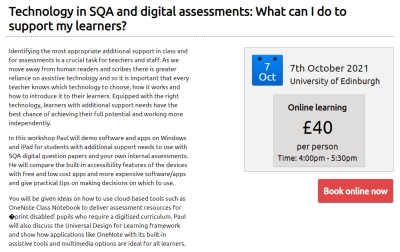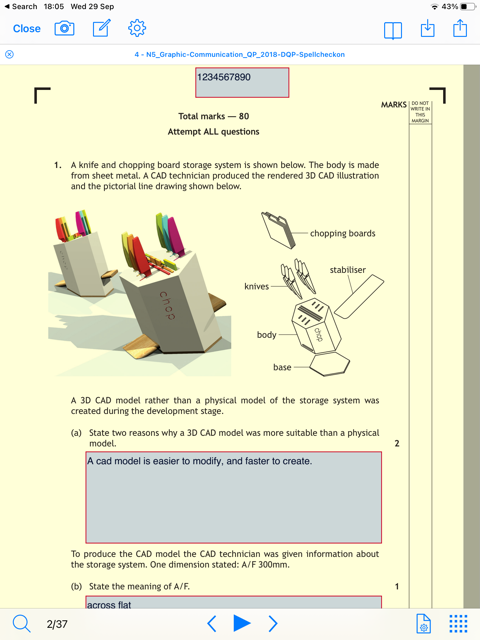 Newsletter: join thousands of other people
Newsletter: join thousands of other people
Once a month we'll send you an email with news, research and thoughts, as well as training courses and free webinars you may wish to attend.
Our websites:
Posted by Paul Nisbet on the 29th September, 2021

With the announcement that SQA examinations will be held in Spring 2022 if public health advice allows, what does that mean for learners with additional support needs who wish to use technology to access the assessments?
On August 18th, Scottish Government announced that
National 5, Higher and Advanced Higher exams will be held in spring 2022 if public health advice allows.
and SQA stated that
SQA exams will take place from 26 April to 1 June 2022 with results day on 9 August 2022.
Since SQA examinations were last held in the 'traditional' sense in 2019, there has been a huge upheaval in Scottish education as a result of the Covid-19 pandemic and response. If examinations run as planned in 2022, it will be three years since candidates have sat external SQA assessments (although some might argue with that statement, since an SSTA survey found that 64% of teachers used the SQA exemplar papers in full and 33% of teachers used them in part, in 2021).
Over the last 18 months, teachers, learners and parents/carers have developed new digital skills in online teaching and learning and the use of technology for assessment. In addition, more learners have been provided with personal digital technology for learning. All pupils in Glasgow and Scottish Borders secondary schools are being provided with personal iPads and City of Edinburgh Council recently announced a similar initiative. The roll-out of iPads in Glasgow and Scottish Borders has been accelerated as a result of Covid-19. Learners in Aberdeen, Highland, Moray, Stirling and West Dunbartonshire are being provided with Chromebooks.
The Scottish Government Covid-19 laptop scheme initially provisioned 25,000 Chromebooks (18 out of 32 authorities apparently accepting the devices; the other authorities used the funding offered to invest in other technologies ) and 72,288 devices were distributed as of 13 July 2021.
In March 2021 John Swinney said “Just as in my day, the teacher handed out a jotter to all, so in this internet age, we will hand each child the device they need to learn and prosper” and in August 2021, Scottish Government has
committed that by the end of this parliamentary session, all 700,000 school-aged pupils in Scotland will have access to an appropriate digital device, and where necessary an internet connection, to support their learning.
In the very near future every learner in Scotland the senior phase will have a personal digital device, and this raises several questions regarding the use of technology as an assessment arrangement. For many learners with disabilities and/or additional support needs, it is likely that assistive technology will become the “normal way of learning and producing work” and therefore it is probable that the use of technology-based assessment arrangements for students with disabilities or additional support needs will become more prevalent.
Details of the 2022 examination diet have not been published as yet, but it is likely that the assessments will follow a similar process to 2019, and that students with disabilities or additional support needs will have the option of requesting to use technology to access the assessments. Since SQA introduced Digital Question Papers in 2018, there has been a steady increase in the use of technology as an Assessment Arrangement, and given that more and more learners will have a personal device in 2022 and that learning with technology is becoming so common, it is very likely that even more learners will wish to use their devices in the 2022 examinations (and prelims and internal assessments).
With that in mind, we are offering an online course on Technology in SQA and digital assessments on Thursday 7th October and if this topic is of interest to you there is still time to sign up.

Identifying the most appropriate additional support in class and for assessments is a crucial task for teachers and staff. As we move away from human readers and scribes there is greater reliance on assistive technology and so it is important that every teacher knows which technology to choose, how it works and how to introduce it to their learners. Equipped with the right technology, learners with additional support needs have the best chance of achieving their full potential and working more independently.
The technology landscape has changed considerably since 2019: a few years ago devices running the Windows OS were most common in Scottish secondary schools but now we have very large numbers of learners who are using iPads or Chromebooks. Secondly, the SQA Digital Question Papers are PDFs, originally created for the Windows platform, and they function differently on iPads and Chromebooks.
In recognition of this, SQA have asked CALL to investigate two key areas:
SQA policy on the use of laptops and tablets in external examinations is that access to the internet or to other potential sources of information is disabled which was fine when schools had PCs connected to school servers, but I don't think it's viable now that schools are using cloud-based storage such as Microsoft OneDrive or Google Classroom. iPads and particularly Chromebooks are really designed with cloud storage and internet in mind.
So I am very keen to speak to and hear from practitioners around this question. What have you used / are you using for digital assessment? How do you create and deliver assessments securely? Do you require to use the internet? We will feed these discussions back to SQA and help to inform a policy on internet access for assessments. Please contact me at Paul.Nisbet@ed.ac.uk.
It seems likely that learners with additional support needs who are using an iPad or Chromebook every day in class to support their learning will wish to use the same tools in an assessment but there are some challenges.

For example, to type your answers into a Digital Question Paper with answer boxes on an iPad you need an app like ClaroPDF or PDF Expert. My understanding is that neither of these apps are currently available to the managed iPads in Glasgow or Scottish Borders.
With Chromebooks, our research suggests that options for accessing Digital Questions Papers are really not satisfactory (although the situation is changing all the time and there are some promising Android apps, if you can run Android apps on the Chromebook).
Therefore it's vital to understand what learners and practitioners hope to use in terms of assistive technology for Assessment Arrangements, identify challenges and develop and share solutions. We're almost halfway to Christmas so time is pressing.
Again in the first instance please contact me by email at Paul.Nisbet@ed.ac.uk, but I think we need to create a mechanism for everyone to discuss these issues and so I have in mind to try and set something up.
In the meantime:
SQA would like to better understand your experiences and expectations of delivering assessments remotely, to help improve the guidance available to centres delivering their qualifications. SQA says:
This survey is for centres and practitioners. we would like your input whether you have been assessing learners remotely or not, and if you deliver SQA qualifications or those from other awarding bodies. Please complete our survey to help shape our approach and ensure your voice is heard:
Remote delivery of assessment – survey
The survey will feed into wider discussions with groups of education practitioners and case-studies of remote assessment approaches used in SQA centres.
It should take around five minutes to complete and will be open until 30 September. All feedback is welcome and please be assured that all responses are anonymous unless answering on behalf of an organisation.
Please feel free to share the link with colleagues and others in the sector.
Many thanks for your help!

4-week short study online course

Once a month we'll send you an email with news, research and thoughts, as well as training courses and free webinars you may wish to attend.
Our social media sites - YouTube, Twitter and Facebook